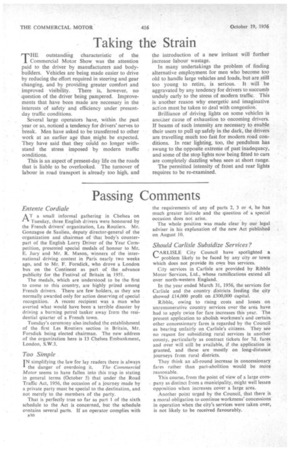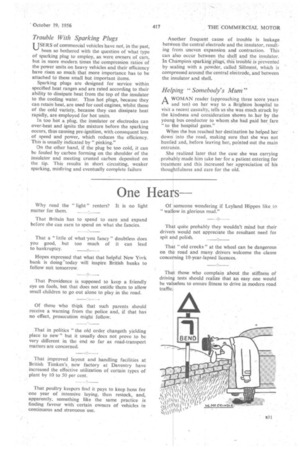Passing Comments
Page 36

Page 37

If you've noticed an error in this article please click here to report it so we can fix it.
Entente Cordiale
A T a small informal gathering in Chelsea on r-1 Tuesday, three English drivers were honoured by the French drivers' organization, Les Routiers. Mr. Gonzague de Saulieu, deputy director-general of the organization and chairman of -that body's counterpart of the English Lorry Driver of the Year Competition, presented special medals of honour to Mr. E. Jury and Mr. R. Mason, winners of the international driving contest in Paris nearly two weeks ago, and to Mr. F. Forsdick, who drove a London bus on the Continent as part of the advance publicity for the Festival of Britain in 1951.
The medals, which are understood to be the first to come to this country, are highly prized among French drivers. There are few holders, as they are normally awarded only for action deserving of special recognition. A recent recipient was a man who averted what would have been" a terrible disaster by driving a burning petrol tanker away from the residential quarter of a French town.
Tuesday's ceremony also included the establishment of the first Les Routiers section in Britain, Mr. Forsdick being elected chairman. The new address of the organization here is 13 Chelsea Embankment, London, S.W.3.
Too Simple
IN simplifying the law for lay readers there is always I the danger of overdoing it. The Commercial Motor seems to have fallen into this trap in stating in general terms (October 5) that under the Road Traffic Act, 1956, the occasion of a journey made by a private party must be special to the destination, and not merely to the members of the party.
That is perfectly true so far as part 1 of the sixth schedule to the Act is concerned, but the schedule contains several parts. If an operator complies with
the requirements of any of parts 2, 3 or 4, he has much greater latitude and the question of a special occasion does not arise.
The whole position was made clear by our legal adviser in his explanation of the new Act published on August 10.
Should Carlisle Subsidize Services?
CARLISLE City Council have spotlighted a problem likely to be faced by any city or town which does not provide its own bits services.
City services in Carlisle are provided by Ribble Motor Services, Ltd., whose ramifications extend all over north-western England..
In the year ended March 31, 1956, the services for Carlisle and the country districts feeding the city showed £14,000 profit on 000,000 capital.
• Ribble, owing to rising costs and losses on unremunerative country services over the area have had to apply twice for fare increases this year. The present application to abolish workmen's and certain. other concessionary fares is regarded by the Council as bearing unfairly on Carlisle's citizens. They see no reason for subsidizing rural services in another county, particularly as contract tickets for 7d. fares and over will still be available, if the application is granted, and these are mostly on long-distance journeys from rural districts.
They think an all-round increase in concessionary fares rather than part-abolition would be more reasonable.
This course, from the point of view of a large company as distinct from a municipality, might well lessen opposition when increases cover a large area.
Another point urged by the Council, that there is a moral obligation to continue workmens' concessions. in operation when the city's services were taken over, is not likely t.o be received favourably.
Trouble With Sparking Plugs
TSERS of commercial vehicles have not, in the past, been so bothered with the question of what type of sparking plug to employ, as were owners of cars, but in more modern times the compression ratios of the power units on heavy vehicles and thcir efficiency have risen so much that more importance has to be attached to these small but important items.
Sparking plugs are designed for service within specified heat ranges and are rated according to their ability to dissipate heat from the top of the insulator to the cooling water. Thus hot plugs, because they can retain heat, are used for cool engines, whilst those of the cold variety, because they can dissipate heat rapidly, are employed for hot units.
In too hot a plug, the insulator or electrodes can over-heat and ignite the mixture before the sparking occurs, thus causing pre-ignition, with consequent loss of speed and power, which reduces the efficiency. This is usually indicated by " pinking."
On the other hand, if the plug be too cold, it can be fouled by carbon forming on the shoulder of the insulator and meeting crusted carbon deposited on the tip. This results in short circuiting, weaker sparking, misfiring and eventually complete failure Another frequent cause of trouble is leakage between the central electrode and the insulator, resulting from uneven expansion and contraction. This can also occur between the shell and the insulator. In Champion sparking'plugs, this trouble is prevented by sealing with a powder, called Sillment, which is compressed around the central electrode, and between the insulator and shell.
Helping • "Somebody's Mum"
A WOMAN reader (approaching three score years I-1 and ten) on her way to a Brighton hospital to visit a recent casualty, tells us she was much struck by the kindness and consideration shown to her by the young bus conductor to whom she had paid her fare "to the hospital gates."
When the bus reached her destination he helped her down into the road, making sure that she was not hustled and, before leaving her, pointed out the main entrance.
She realized later that the case she was carrying probably made him take her for a patient entering for treatment and this increased her appreciation of his thoughtfulness and care for the old.












































































































